Sexual Misconduct of the Middle Classes Review
05.06.2022
Walking out of Sexual Misconduct of the Middle Classes I was totally unsure if I loved it or hated it, and in the end that feels like the point.
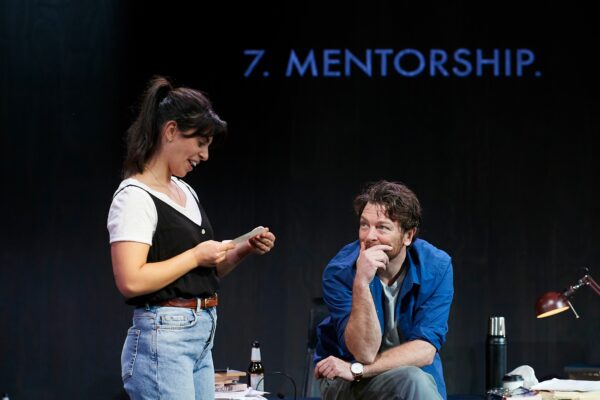
The play hurtles through the complex and unsettling romance of Jon – a ‘rockstar author’ who also works as a university lecturer and Annie – his long-time fan and 19-year-old student. Placed firmly within the context of the #MeToo era, this story is an abject one. The tone is set in the early moments as Jon drinks from a thermos while regaling us of a time when the cleaners had shut up shop early and he was forced to piss into what we can only imagine is the very same flask. Right there at the top of the play, we are warned that Jon is a pig who (while obviously very self-aware in some ways) is ultimately blind to his own arrogance. Yet the strength of the writing from Canadian playwright Hannah Moscovitch makes us forget his arrogance over this rapid 90 minutes, and occasionally we (like young Annie) are swept away by his self-assured, twinkle-eyed charm.
This story unfolds almost entirely from Jon’s point of view and he is handled nicely by Dan Spielman. He speaks in the third person and directly to us for most of the play, snapping into first-person dialogue whenever Annie enters the stage, played by the wonderful Izabella Yena. There is subtlety and nuance to Jon, gorgeously brought to life by detailed direction from Petra Kalive. His direct address to the audience flits from thought to thought, always conscious of finding the right words as we jump through the story with him. Speaking in the third person, we’re set up to feel as though we are getting the writer’s sense of Jon – and the writer has mixed feelings. He’s one of those people you can’t help but kind of fall for even as you audibly gag at his predatory instincts.
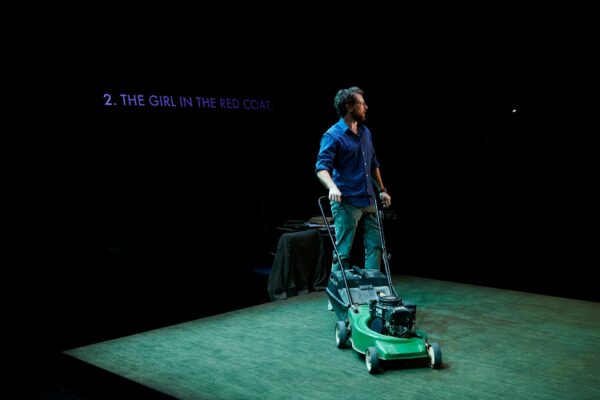
Annie, however, feels much more underdone. A woman constructed within Jon’s male gaze. The fictional schoolgirl that male writers lust over; and lust Jon does. For much of the play, it felt frustrating, unfair, and ridiculous that Annie was being represented purely from Jon’s frankly creepy perspective in a play that so clearly understood why that was a problem in our #MeToo era. This is what I meant up top, about the fine line between love and hate the audience is asked to sit on in this production.
The set and lighting help us along though, shifting from moment to moment but lingering always in the background. Memories jumbled together and left to gather dust. Light spearing through the space pinpointed each moment like an intrusive thought, making you cringe as it surfaces after years left purposefully forgotten. Kalive deftly handles it all, leading us by the hand and keeping us on tenterhooks until the big bait and switch at the end of the play. Then, the real meaning of this show is suddenly thrown into light as Annie wrestles back control, disregarding Jon and finally looking us in the eye and taking over what has always been her story. It’s only at the very end as the lights go down that we realise what game has been being played by the writer all along. Only then do we understand that Annie is far more than Jon – and by extension, the audience – has ever given her credit for.
This production is ultimately about the way women’s experiences are far more complex than men dare recognise, because women are fighting against an inherent and systematic lack of power that many men simply cannot fully comprehend. As young women, those power dynamics constantly used against us can feel insurmountable and Sexual Misconduct of the Middle Classes absolutely rings true in that regard. As Jon looks at Annie with genuine pride in the final scenes set many years later when she is a successful writer, I gagged. He truly thinks of himself as her shepherd, nurturing her talent, looking back on their torrid affair with a fondness for the time they had shared. He thinks he did her a favour and the audience can’t stand his delusion.
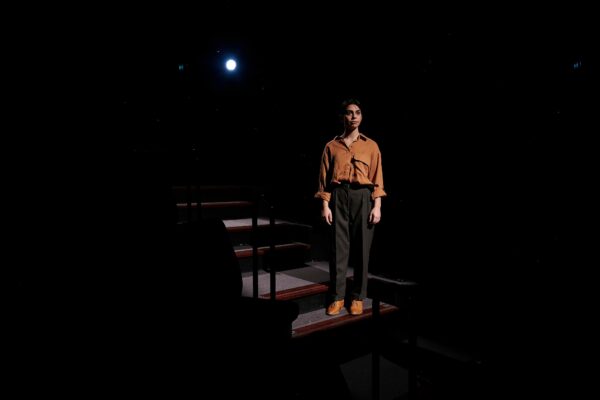
The power of this writing is that Annie never takes on the victim role many of our peeping eyes may sadistically want to see. This man has not broken her. But why should that make what he did any less wrong? As I left the theatre, I heard people lamenting she hadn’t gone on a tirade, taken back the microphone at the end and given us a classic feminist rant for the ages. At the time I agreed – it had me torn. Did I love this show or hate it? Thinking back on it now, I’m beginning to realise that maybe we all had missed the point. She shouldn’t need to tell us what we already know. Women shouldn’t need to write plays decrying their all too common personal experiences. ‘#MeToo plays’ should not be a category of literature. Maybe the ‘rockstar authors’ should just learn to do better.
4 Stars.
Lily, 24 [she/her]
________________________________________________
Undoubtedly a thought-provoking watch.
The show follows a middle-aged author turned professor as he initiates an affair with one of his students. Dan Spielman is absolutely mesmerising and exceptionally talented, effortlessly holding the fort before we meet Annie. He paints Jon out to be intriguing and likeable before making our stomachs churn as he submits to emotional turmoil and lust by engaging in this sexual relationship with painfully innocent Annie, played by the refreshing Izabella Yena.
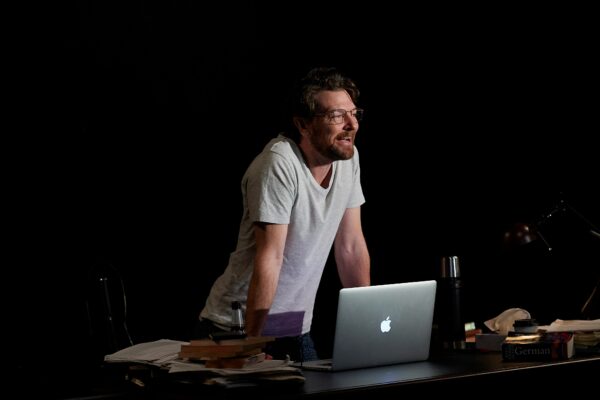
It was disturbing to watch a young and promising woman become a pawn to a wilting man’s desires. The blocking and ever-present intricacy were captivating, overseen by the admirable Petra Kalive. The stark casting of a short, young, and beautiful girl against a much taller and older man paints so vividly a common, hush-hush scenario as we watch their bodies intertwine. My heart broke more and more with every time Annie was disappointed and overlooked – could this risqué fling ever provide her with the acceptance and love that her young heart was yearning for?
At the close of the play, we are left with a huge revelation that was highly intelligent and masterfully done by Canadian playwright, Hannah Moscovitch. Although it did feel unfinished. I needed to see and hear more from Annie for her specifically to take charge and take back her narrative with stronger valour. Unfortunately, I felt the nature of the ending excused Jon’s activity and, even though the end of the play is not the end of Annie’s life, that Annie would deny herself the respect of coming forward as a victim or acknowledging that wrong was done to her.
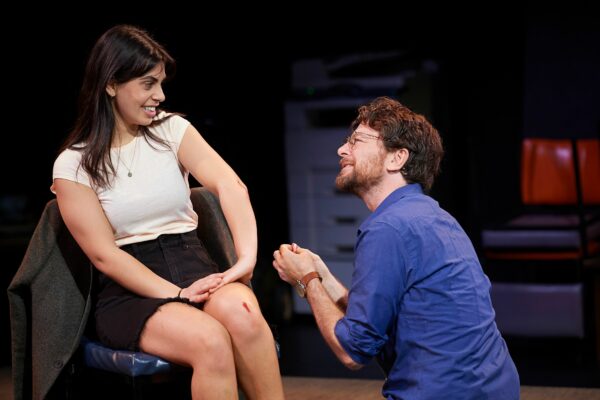
In design terms, the set was understated and gorgeous. Books, chairs, stationary all stacked up in carefully chosen shapes, almost all of which were used at one time to create a new setting. Yet it was still ‘mundane’ enough to allow us to focus on the plot. The lighting also deserves a special mention as I was pleased with the layering of warm hues right down to lights amongst a stack of books. The follow-spot created a nice foreshadow to this end’s revelation- which you’ll have to see to find out.
4 Stars.
Anjelica, 21 [she/her]
Melbourne Theatre Company’s Sexual Misconduct of the Middle Classes plays at Belvoir St. Theatre from the 2nd of June to the 10th of July. Book tickets here.

